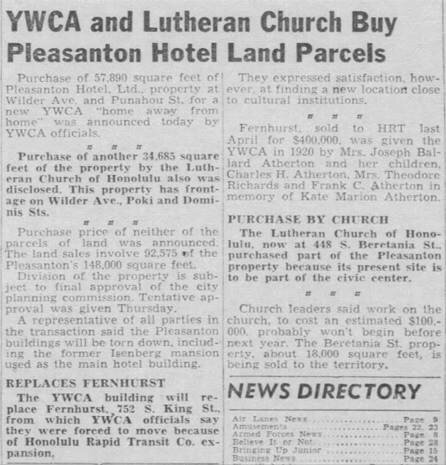A Moment in Our History: Fernhurst's Continuing Evolution
In our inauguration year of 1900, our board was focused on establishing a headquarters building, but that was not the only work members were doing. Our leaders wanted to create a “boarding house” for the working women of Oahu, and the Boarding Home Committee was established to move that plan forward.
Our plan came into reality in the form of a joint project with YMCA. The two organizations opened a boarding house called Engleside on Vineyard in 1904.
The Honolulu Advertiser: July 25, 1904
Four years later, we opened our first home for girls, called “Homestead”. This was made available thanks to a gift for the leasehold for 25 years of the Castle House on King Street.
The Honolulu Advertiser: May 26, 1908
Although Julia Morgan’s name is often associated with our historic headquarters Laniākea – it was her second architectural design work for YWCA O'ahu. Prior to Laniākea she designed Fernhurst, which opened at the corner of Alapai and King Streets in 1921. The three-story building with 35 bedrooms had a feel described as “southern colonial adapted to local conditions.” Most rooms were dedicated to “permanent guests” with some set aside for “transients.”
Julia Morgan’s Fernhurst opened in 1921. Each resident had “her own bed and a built-in bureau.”
The site valued at $80,000 and the building valued at $70,000 were gifted by the Atherton family –in memory of Miss Kate Marion Atherton who passed away in 1919 after suffering a long illness. Her mother Mrs. Juliette M. Atherton, who played a pivotal role in making this gift to honor her daughter passed away two years later, a few months prior to the opening of the building. The J.B. Atherton family made the location their home for more than 40 years before making way for YWCA.
Miss Kate Marion Atherton also left a bequest gift of $10,000 to YWCA from her estate
Mrs. Juliette M. Atherton was deeply committed to the “welfare of the people of Hawai'i” and created the Juliette M. Atherton Trust which became the foundation for the Atherton Family Foundation.
Mrs. Juliette M. Atherton once spoke of their gift to Fernhurst as follows:
“[Fernhurst]...given in memory of my daughter Miss Kate Marion Atherton, who always maintained a deep interest in girls and young women, seeking to do all she could to make their lives happier and more useful, and we trust that through such a home your Association may thus minister to the young women of this city.”
The name “Fernhurst” is said to derive from many ferns that “grew around the stately palms that lined the driveway and else-where on the ground.” Mrs. Atherton was a botanist and she showed “remarkable ability and had herself collected specimens of all the known varieties of ferns in Hawaii.” This also might explain why the property was surrounded by ferns.
Fernhurst residents reminisce about their stay in 1951 before the move to the new Wilder Avenue location. (The Honolulu Advertiser: December 16, 1951)
For 30 years, this building served as “a home away from home” to more than 10,000 working women, from secretaries to officer workers, before it was sold to Honolulu Rapid Transit Company in 1951 that “needed parking areas for its expanding fleet of buses.”
The Honolulu Advertiser: August 5, 1950
Fernhurst moved to Makiki in 1952 – at the former site of the Pleasanton Hotel. Mrs. Frank E. Midkiff, the granddaughter of Mrs. Juliette M. Atherton was our board president between 1936 and 1939 and she headed a committee that helped purchase the site and manage the move.
Fernhurst moved to Makiki in 1952 – at the former site of the Pleasanton Hotel. Mrs. Frank E. Midkiff, the granddaughter of Mrs. Juliette M. Atherton was our board president between 1936 and 1939 and she headed a committee that helped purchase the site and manage the move.
The Fernhurst facility that opened in 1952 had a much larger footprint than the current building.
Residents enjoyed various activities on the property and built friendships
Fernhurst closed its doors temporarily at the end of 2002 for much-needed renovations after 50 years of service. The work included bringing “the first floor into compliance with the Americans with Disabilities Act,” and upgrading the plumbing and electrical systems and general facelifts. Roughly half of the Fernhurst property was sold to pay for the project in addition to funds raised through community support including a $1 million grant from the Harry and Jeanette Weinberg Foundation. The work was completed in 2004.
Fernhurst today
A few years after reopening, we added the Homebase program to provide transitional housing with supportive services to help women working towards financial stability and permanent housing. In 2015, YWCA O'ahu introduced to Fernhurst the state’s only community-based furlough program for women, named Ka Hale Ho‘āla Hou No Nā Wāhine or “The Home of Reawakening for Women.” Through these two programs, YWCA O'ahu supports women transitioning from incarceration and economic hardships. Our work of assisting women seeking self-sufficiency and independence continues today.
Fernhurst in the 1960’s
Fernhurst today
-Noriko Namiki, YWCA O‘ahu CEO

















